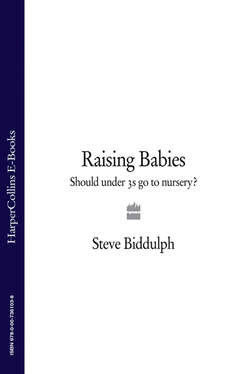Читать книгу Raising Babies: Should under 3s go to nursery? - Steve Biddulph, Steve Biddulph - Страница 36
Оглавление3 Does nursery harm under-threes?
The daycare debate first began to really heat up about thirty years ago. As the use of day nurseries for very young children increased in the 1970s, child development experts began to be concerned about what this kind of care might do to the child. The effects of separation from parents in wartime had become a major area of study, and was already leading to changes in how children were treated – for instance, it was realized that children in hospitals needed to have their parents visit daily or, even better, stay with them, while in the past they had been actively prevented from visiting more than once a week. Dr John Bowlby’s research into ‘attachment’ problems in children separated from their parents was now cited to suggest that the bond between mother and child, known to be necessary to the healthy development of children, was endangered if a mother entered full-time work too soon, and that children in nurseries would not develop well without the secure and loving input that a parent or family member provides.1
Vested interests
At the same time, a new industry – and a new profession – was mushrooming around the demand for well-conducted nurseries, and ‘Early Childhood’ departments sprang up in universities and technical colleges, aimed at training childcare directors and teachers. These departments were well funded by governments on both the left and right, who saw the tax advantages of having everyone in the workforce, with the additional advantage of appearing progressive and woman-friendly at the same time.
These departments were often set up in universities that already had psychology departments with child development units within them, which trained psychologists and child welfare workers. These parallel faculties often found themselves preaching opposite points of view – though both were committed to the well-being of children, they had different ways of arriving there. A common statement from the Early Childhood school of thought was the fatalistic one that nursery care ‘was here to stay’ and that therefore ‘we have to do what we can to make it as good as possible’. The opposing camp felt that parents must be alerted to the drawbacks of nursery care and influenced not to abandon their children in the rush towards self-obsession that gave them the label of the ‘Me generation’. Clearly, there was some truth on both sides, but the emotive and politicized situation did not make for objective research.
In the early 1980s there was continuing disquiet about infant daycare, but little evidence of harm was reported in studies at that time. The worries were theoretical and, to some degree, based on intuition or folk wisdom about what children need. Yet it made sense to be cautious – half a million years of childrearing was being tampered with, and we didn’t really know the long-term effects. The two sides of the debate became quite passionate: people on both sides wrote angry letters to the newspapers, grandmothers argued with their daughters about putting their precious grandchildren into a nursery. More than a few offered to mind the children instead.
